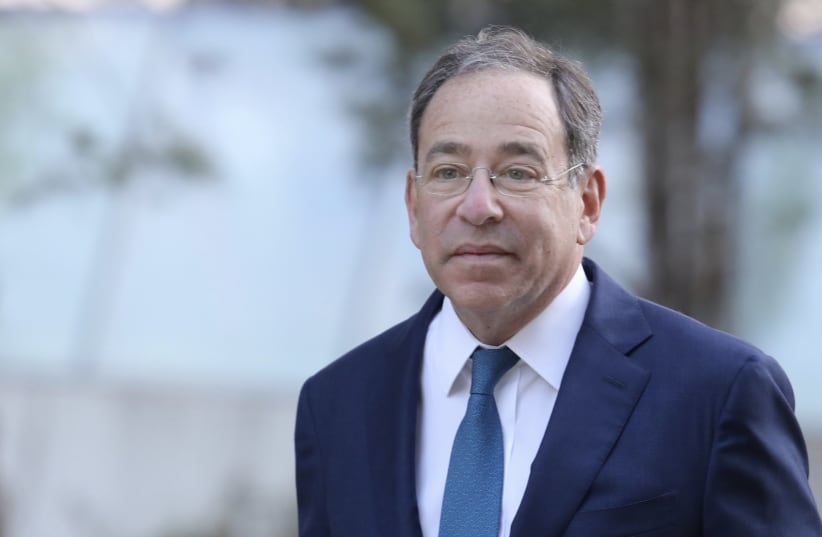West Bank settlement growth is “infuriating” but not every settler home can be blocked, said US Ambassador to Israel Tom Nides, explaining however that he had worked to halt the advancement of the controversial E1 project.
“We can’t do stupid things that impede us for a two-state solution,” Nides told the left-wing group Americans for Peace Now during a virtual event on Tuesday. “We can’t have the Israelis doing settlement growth in east Jerusalem or the West Bank. I’m a bit of a nag on this, including the idea of settlement growth – which infuriates me, when they do things – just infuriates the situation, both in east Jerusalem and the West Bank.”
Nides said that he “would be lying” if he said that it was possible to avert “every single house that is built. I can’t stop everything, just so we are clear.”
The US ambassador explained that he has to pick and choose his battles, and that he had fought to prevent the advancement of a 3,500-apartment project in an area of the Ma’aleh Adumim settlement known as E1.
The Right has spoken of the project’s importance in expanding Ma’aleh Adumim and ensuring the preservation of a Jewish corridor around Jerusalem.
The Palestinian Authority and the international community have argued that it would make a future Palestinian state nonviable.
Construction of E1 would be a “disaster,” Nides said. “I went full board on E1... It is a very important area which if [built] could cut off any possibility of a capital for the Palestinians.”
Nides said he recognizes that “Jerusalem is the capital of Israel,” but cautioned that “the final status of Jerusalem would have to be decided by the parties.” The Trump administration also believed that the status of Jerusalem would be finalized through negotiations, he added.
The ambassador repeated the Biden administration’s pledge that it would reopen the Jerusalem Consulate General, which had been a de facto embassy for the Palestinian Authority until former president Donald Trump closed it in 2019.
“We want to open it,” said Nides, but Israel has “aggressively opposed it,” while the PA has desired the resumption of that mission. He cautioned that both the Israelis and the PA “have made way too big a deal over this.”
The ambassador discussed his concern about the possibility of violence due to the overlap this year of the Passover, Easter and Ramadan holidays.
Nides also spoke out against the PA policy of paying monthly stipends to terrorists and their families.
“These martyr payments... have caused an enormous amount of problems,” Nides said, adding that it gives the “haters” an excuse not to support the PA based on the argument that it is “paying for people who killed Jews.” He said he is working with Prime Minister Naftali Bennett and Defense Minister Benny Gantz as well as the PA to find a way to halt the payments.
Economic measures are important, said Nides, while speaking of the importance of major companies such as Google opening in Ramallah, and that it is also important to ensure that Palestinians have 4G technology.
Economic peace, however, is limited without a two-state resolution to the conflict.
“The Palestinians can’t be bought off,” the ambassador said.
Nides cautioned, however, that no such plan was in the offing in the next six months: “I would be lying to you if I said I had a peace plan ready to roll out. At some point would this administration engage in trying to do something broader? Maybe.”
In the interim, his job is to preserve conditions for two states, because “a one-state solution is a disaster for everyone involved.”
Coalition Knesset member Mossi Raz (Meretz) praised Nides’s statement about settlements.
“Building in the settlements is unethical, against international law and makes it more difficult to achieve the two-state solution,” said Raz, a former head of Peace Now. “Such construction also harms relations between Israel and the international community. The war in Ukraine makes it even more clear how important such relations are.”
Several right-wing MKs in the coalition declined to comment.
Opposition MK Simcha Rothman (Religious Zionist Party) said he was disturbed by the ambassador’s statement that the problem with the PA policy of paying stipends to terrorists and their families is that it gives the “haters” an excuse to not support the PA. Rothman said he was proud to be a “hater” in the eyes of the ambassador.
“Everyone except the American ambassador must be ‘haters,’ not the terrorists and their supporters,” Rothman said sarcastically. “This twisting of ethics requires rethinking about the American ambassador’s understanding of the Israeli-Palestinian conflict and his ability to serve as a mediator.”
Rothman’s party colleague, MK Orit Struck, said that Nides “revealed cooperation with Bennett and Gantz to whitewash funding for terrorists. The ambassador said it was done to strengthen international support for the Palestinian Authority and improve its image. How far have you fallen, Naftali? Thank you to the American ambassador for taking off his mask.”
Yesha Council head David Elhayani said that it would be better “if the ambassador dealt with really dangerous issues” such as “the Iranian nuclear threat to the entire Middle East.”
Nides, he said, should also focus on the “dozens of terrorist incidents that take place every day in Judea and Samaria against innocent Israeli citizens, the illegal takeover of Judea and Samaria, and the destruction of its archaeology and heritage sites.
“Judea and Samaria is the land of the Jewish people, so it was and so it will remain,” said Elhayani.
Efrat Council head Oded Reviv chalked up Nides’s comments to internal US politics.
“It is disappointing that the Biden administration is viewing US-Israel relations through their domestic political lens,” Revivi said. “Whether it is their desperate efforts to achieve a tragically weak Iran nuclear deal or their need to appease radicals who oppose Israeli construction in our capital, this administration is on a trajectory that will lead to continued destabilization and less peace. In my first meeting with Ambassador Nides, I encouraged him to visit Efrat, where he could view for himself the immense potential that Israeli-Palestinian collaboration can offer as a pathway to resolve the conflict.”
Ma’aleh Adumim Mayor Benny Kashriel said he planned to file an appeal to the Jerusalem District Administrative Court against Bennett and Gantz for freezing the E1 project.
The Civil Administration had been holding a series of hearings on objections to the plan when it informed the municipality that the process had been indefinitely suspended.
Kashriel said he had sent a legal letter to Bennett and Gantz explaining that they lacked the authority to halt the Civil Administration’s administrative process. He never received a response and now plans to turn to the court.

